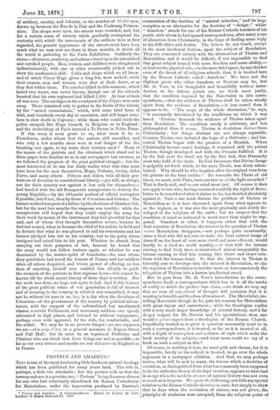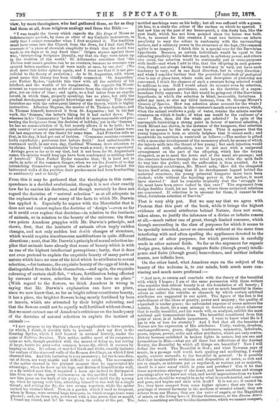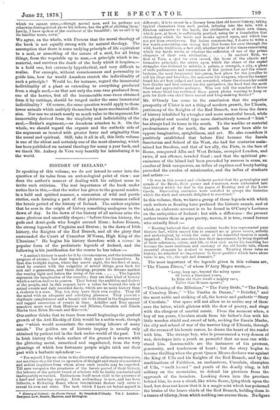PROTEUS AND AMADEUS.*
Tins is one of the most fascinating little books on natural theology which has been published for many years back. The title is, perhaps, a little too scholastic ; but the preface tells us that the correspondence is a genuine one, " Proteus " being the name chosen for one who had reluctantly abandoned his Roman Catholicism for Materialism, under the impression produced by Darwin's • Proteus and Amadeus. A Correspondence. Edited by Aubrey de Yere. London; C. Kogan Paul and Co. 1578. enunciation of the doctrine of " natural selection," and its large reception as an alternative for the doctrine of " design ;" whilst " Amadeus " stands for one of the Roman Catholic teachers of his youth, with whom he had opened correspondence, after many years of alienation from Christianity, in the hope of finding some reply to his difficulties and doubts. The letters do not touch, except in the most incidental fashion, upon the subject of Revelation. They are concerned entirely with the alternatives of Theism and Materialism, and it would be difficult, if not impossible to find that great subject treated with more freedom and more ability,— at least on the physical side,—in the same brief space, by any thinker even of the freest of all religious schools, than it is treated here by the Roman Catholic called Amadeus.' We have not the slightest guess who either Amadeus or Proteus may be, but Mr. de Vere, in his thoughtful and beautifully written intro- duction to the letters, points out, we think most justly, that the condition imposed by the Materialist in this corre- spondence,—that the evidence of Theism shall be taken wholly apart from the evidence of Revelation, —is less sound than it appears to be. " The scope of the whole discussion," he says, " is necessarily determined by the conditions on which it was based. Proteus demands the evidence of Theism taken apart from Revelation. The condition surely is arbitrary, and less philosophical than it seems. Theism is doubtless distinct from Christianity ; but things distinct are not always separable. Genuine Theism ever included the hope of a Deliverer ; and his- torical Theism began with the promise of a Messiah. When Christianity became man's heritage, it remained still the primal Theism, though developed and with the Promise fulfilled. It is by the link next the hand, not by the first link, that IIumanity must take hold of the chain. In God Incarnate that Divine Image is palpably set forth which, to the mere Theist, was dimly adum- brated. Why should he who inquires after the original turn from the picture to the faint outline ? To resemble the Theist of old times, we must, with Plato, turn our face to all the light accorded." That is finely said, and to our mind most just. Of course it does not apply to one who, having examined carefully the right of Reve- lation to be considered what it claims to be, has decided absolutely against it. Such a one must discuss the problem of Theism or Materialism as it is here discussed, apart from what appears to - us the highest, as it was also the most gradually and slowly de- veloped of the religions of the earth ; but we suspect that the condition of mind so indicated is much rarer than might be sup- posed. Somehow or other, it happens either that with the final rejection of Revelation, the interest in the question of Theism versus Materialism disappears, —not perhaps quite unnaturally, since a God who did not care to make the faint natural image of himself on the heart of man more vivid and more efficient, would hardly be a God we could worship,—or that with the intense craving to find God, there is intertwined almost inseparably the intense craving to find him coming into closer and closer rela- tions with the human heart. So that the interest in Theism is tolerably sure to develop° into the interest in Revelation, or else the rejection of Revelation to involve more or less consciously the relegation of Theism into a barren intellectual creed.
But to pass from Mr. de Vere's introduction to the corre- spondence itself, a correspondence which has in it all the marks of reality to which the preface lays claim,—we think we may say that no man of any school of thought will maintain that it is wanting in breadth and freedom of treatment. The Materialist, un- willing Materialist though he be, puts his reasons for Materialism with great vigour and earnestness ; while the theologian replies with a very much larger knowledge of natural history, and a far deeper respect for Mr. Darwin and his speculations, than one would a priori expect from a theologian of the Roman Church. Imperfectly treated as so great a question necessarily must be in such a correspondence, it is treated, so far as it is treated at all, with a depth of conception and a charm of style which make the book worthy of its subject,—and what more could we say of a book on such a subject as this ?
Of course, in noticing it here, we must pick and choose, for it is impossible, briefly as the subject is treated, to go over the whole argument in a newspaper criticism. And first, we may perhaps notice, what will be new to many, the favour which a doctrine of evolution, as distinguished from what has commonly been supposed to be the orthodox theory of six days' creation, appears to have had in an age when the modern science of natural history was not even so much as in its germ. We quote the following, not with any special relation to the Roman Catholic doctrine as such, but simply to show that in days when the revelation of science was not given, the principles of evolution were accepted, from the religious point of
view, by mere theologians, who had gathered them, so far as they had them at all, from religious analogy and from the Bible :— "I was taught the theory which regards the Six Days of Moses as indeterminate periods, by some or other of my Catholic instructors, so early that I cannot remember when I first acquired it. The tradition must have come into the Church from the Jews, for I find that Philo accounts it ' a piece of clownish simplicity to think that the world was made in six days or in any fixed time. Origen argues against those who, ' interpreting Scripture literally, say that six days wore taken up in the creation of the world.' St. Athanasius considers that the Verbunt ante ownia genitum can be no creature, because no creature was created before another ; but all were made at once, by one fiat.' (We shall meet this latter opinion again, and I trust see that it is not pre- judicial to the theory of evolution.) As to St. Augustine, with whose great name this theory has been chiefly connected. St. Augustine,' says Father Ryder, upholds this view with all the subtlety of his intellect, and the wealth of his imagination. He regards the Mosaic account as representing an order of nature from the simple to tho com- plex, not an order of time ; and again, as a leaf taken from an angelic record, in which time, properly speaking, has no place, but only the gradual development of angelic knowledge and worship.' This writer furnishes me with the subsequent history of the theory, which is highly instructive. Albertus Magnus, the master of St. Thomas Aquinas, and St. Thomas himself, borrowed it from St. Augustine ; but in his last work, the Summa,' the latter's liking for it had cooled down. For, whereas in his Commentary 'he had styled it' more reasonable and pro- tecting the Scriptures from the derision of infidels,' yet in the Summa' he has no commendation of it, but merely allows it to be held ; he is only careful 'et neutri sententite prejudicetur.' Cajetan and Canus were the last supporters of the theory for some time. And Petavius tells us that, in his day, it had got out of fashion. Commune omnium consensu hodie repndiatur ; patronum fere habere desiit.' And unfashionable it continued until, in our own day, Cardinal Wiseman drew attention to its claims. Indeed unfashionable 'is too weak a word ; it was reprobated. 4 Arriaga goes so far as to say that, had it not been for St. Augustine's name, his opinion would long ago have been condemned as nothing short of heretical.' Then Father Ryder remarks that, 'It is hard not to smile, in spite of the common danger, when we see the Jesuits of to-day entrenching themselves against the attacks of geology behind the batterered walls of the position their predecessors had been bombarding so assiduously and so lately."
From this it may be gathered that the theologian in this corre- spondence is a decided evolutionist, though it is not clear exactly how far he carries his doctrine, and though certainly he does not regard the doctrine of " natural selection " as at all adequate to the explanation of a great many of the facts to which Mr. Darwin has applied it. Especially he argues with the Materialist that it does not and cannot replace the doctrine of design '—even so far as it could ever replace that doctrine—in relation to the instincts of animals, or in relation to the beauty of the universe. On these two points Amadeus grapples with Mr. Darwin's principle, and shows, first, that the instincts of animals often imply sudden changes, and not only sudden but double changes of structure, which would require simultaneous modifications in quite different -directions ; next, that Mr. Darwin's principle of sexual selection im- plies that animals have already that sense of beauty which is with us one of the highest intellectual perceptions ; lastly, that it does not even pretend to explain the exquisite beauty of many parts of nature which have no uses of the kind which he attributes to sexual selection,—for instance, the exquisite beauty of the eggs of birds, as distinguished from the birds themselves,—and again, the exquisite colouring of certain shell-fish, " where, fertilisation being effected by currents of water, selection by choice can have no place." That is very ably put. But we may say that we agree with Proteus that this part of the book, while it brings the highest evidence of mental attributes behind Nature, does not seem, taken alone, to justify the inference of a divine or infinite reason at all,—much rather one of great, though limited resource, which though succeeding in the class of purposes for which it seems to be specially intended, never so succeeds without at the same time interfering with and often spoiling the appliances devoted to the fulfilment of other purposes, for which provision is carefully made in other natural fields. So far as the argument for organic design goes, taken alone, it suggests finite (though great) intelli- gence and finite (though great) benevolence, and neither infinite reason, nor infinite love. On the other hand, what Amadeus says on the subject of the beauty of the universe is, to our minds, both much more con- vincing and much more profound :— "And now, to return and conclude with the theory of the beautiful with which I began ; I am of the same persuasion with those writers who consider that ethical beauty is at the foundation of all beauty; I mean that colours, forms, or sounds, are not so much beautiful in them- selves as rather the vehicles or channels by which certain spiritual attributes are suggested to our spirit. The figure of the lion is the embodiment of the ideas of gravity, power and majesty ; the quality of a harebell is tender grace ; the unbounded expanse of ocean mirrors the infinite. In short, let a man attempt to describe any object whatever that is really beautiful, and his words will, on analysis, exhibit the most spiritual and transcendent ideas. The beautiful, considered from this point of view, is of infinite importance. I want to know what He is I am to win or lose for eternity ? And I find that all the beauties of Nature are the expression of His attributes. Unity, variety, freedom, nnchangeableness, grace, dignity, tenderness, symmetry, infinitude, peace, repose, power, order and other attributes, which are only contra- dictory because exhibited in broken lights in nature, but are one and harmonious in Him—what are all these but reflections of the Ancient Beauty, the Beautiful by which all things are beautiful ? Now I will define the word. The Beautiful is God ; and what Newman says of music, in a passage well worth both quoting and meditating, I would apply, mutatis mutandis, to the beautiful in general. ' Is it possible that that inexhaustible evolution and disposition of notes, so rich and yet so simple, so intricate yet so regulated, so various yet so majestic, should be a mere sound which is gone and perishes ? Can it be that those mysterious stirrings of the heart, and keen emotions and strange yearnings after we know not what, and awful impressions from we know not whence, should be wrought in us by what is unsubstantial, and comes and goes, and begins and ends with itself ? It is not so; it cannot-be. No ; they have escaped from some higher sphere ; they are the out- pourings of eternal harmony in the medium of created sound ; they are echoes from our Home; they are the voice of angels, or the Magnificat of saints, or the living laws of Divine Governance, or the Divine Attri- butes; something are they besides themselves, which we cannot compass, which we cannot utter,—though mortal man, and he perhaps not otherwise distinguished above his fellows, has the gift of eliciting them.' Lastly, I have spoken of the sentiment of the beautiful ; let us call it by its familiar name, LOVE." We agree, on the whole, with Proteus that the moral theology of the book is not equally strong with its natural theology. The assumption that there is some undying principle of life equivalent to a soul, or something of the nature of a soul, for all living things, from the vegetable up to man,—a principle which is im- material, and survives the death of the body which it inspires,— is a bold one, but extremely hypothetical, and very difficult to realise. For example, without consciousness and personality to guide him, how far would Amadeus stretch the individuality of such a principle? Would be, for instance, regard the immaterial individuality of a plant as extending to everything produced from a single seed,—so that not only the rose-tree produced from one of the berries, but all the innumerable rose-trees obtained from it by cuttings, should be ranged under the same immaterial individuality ? Of course, the same question would apply to those lower animals which multiply themselves by mere mechanical divi- sion. Nor can we attach nearly so much value to the argument for immortality derived from the simplicity and indivisibility of the soul,—Butler's argument,—as Amadeus attaches to it. On the whole, we should regard the organic and the esthetic side of the argument as treated with greater force and originality than the moral and spiritual. Still, take it all in all, this little volume is one of the ablest and certainly one of the most charming, which has been published on natural theology for many a year back, and we thank Mr. Aubrey de Vere very heartily for introducing it to the world.




































 Previous page
Previous page